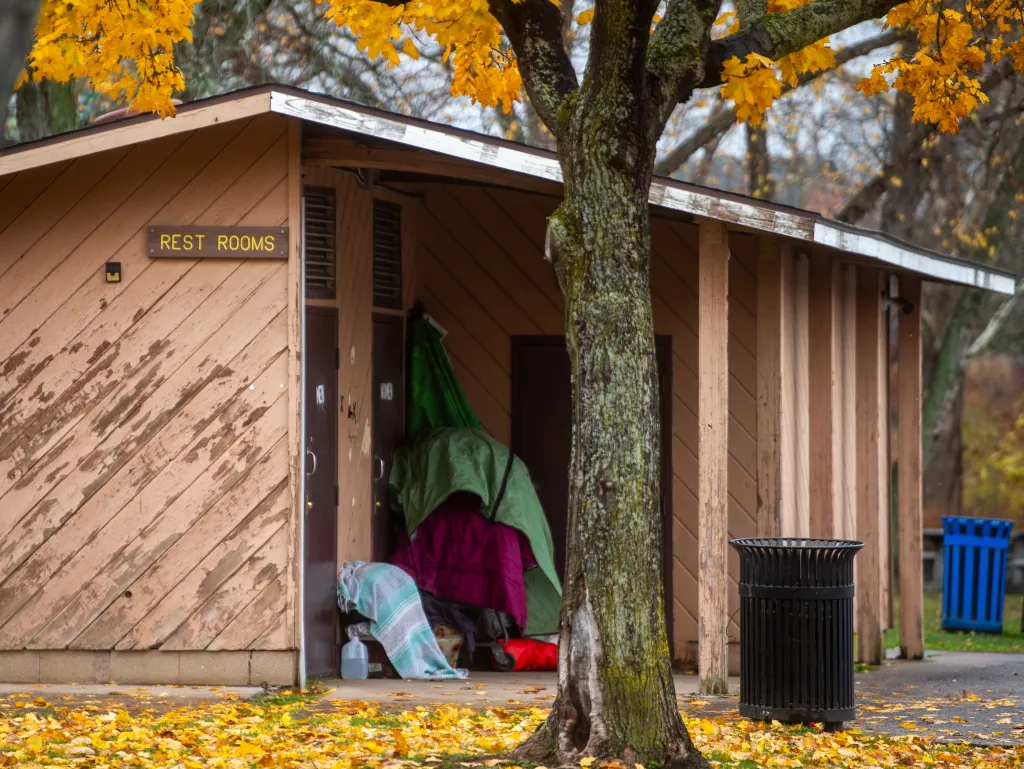Copyright Hartford Courant

Debra Keller remembers sitting in a homeless shelter in Hartford viewing horrific things she never thought she would see. One man was shot in front of her and stabbings were common. She was living on oxygen in a frail state. It was a life far removed from the banking and insurance industry where Keller once worked. Keller found herself homeless at the age of 70 in 2021 after caring for her ill mother who passed away. The bank foreclosed on her mother’s home, leaving her homeless. “It was frightening,” she said. “You never knew from one day to the next where you would lay your head down at night.” Bringing awareness to the rising number of homeless in the state and keenly aware of stories like Keller’s who said she was lucky to find housing, State Sen. Saud Anwar slept out in the elements for one night this past Saturday with several others from the nonprofit Hartford Bags of Love. The event aims to highlight deep concerns for the rising number of homeless in the state and the dire need for more funding to keep them warm this winter. The senator said this year’s statewide point in time count showed nearly a 10% increase to 3,735 people experiencing homelessness. Hundreds of children are currently staying in homeless shelters and thousands of students are identified by their schools as experiencing homelessness, he said. This is Anwar’s seventh year participating in such an event. “Homelessness is a symptom of failed policies,” said Anwar. “The failed policies are not having enough affordable homes and not having a safety net for individuals who may have substance abuse and mental health issues. It is having a safe space for victims of domestic violence and having a management strategy for youth who are going through trouble with family not accepting them for LGBTQ status or other challenges that youth are experiencing and that results in them losing their home and safety net.” Close calls In the seven years that Anwar has slept out in the elements for one night to bring awareness to homelessness, he remembers one year when he contemplated if he would survive. Sleeping in 28 degree weather in a sleeping bag on a yoga mat, Anwar could not feel his feet and his hands. “You sort of become numb and you are in severe pain in your legs because your blood flow is being impacted,” he said. “That night I did not think I would make it. At that moment you are praying to survive the night.” At this year’s event, his sleep was poor — he slept approximately 30 minutes to two hours before waking up due to noise or feeling cold. Joining numerous others with Hartford Bags of Love, a nonprofit helping those in need, Anwar slept Saturday night at Nevers Park in South Windsor with a yoga mat and sleeping bag. The event was also an opportunity to recognize the loss of homeless individuals who died in the state, according to Anwar. Anwar said the lifespan of individuals experiencing homelessness is reduced by 26 to 33 years. Mark Cabot, co-founder of Hartford Bags of Love, said taking part in the event every year is humbling. This year, he shared the experience with his 6-year-old daughter as they huddled to keep warm in the cold temperatures. He was reminded of the many questions that swirl in the minds of those who are homeless such as whether they are safe or if someone is going to steal from them or if they are going to get enough sleep. “It is just a constant reminder why we do the work we do to help those in need,” he said. “It is not a matter of one organization to fix it. It takes all organizations coming together to fix it and support each other.” Also working with Cornerstone Foundation in Vernon, Cabot said that the need of families experiencing homelessness is great and one the nonprofit is unable to meet. “We are a triage shelter,” he said. “We have 40 to 45 families every night and we are at capacity.” Dire need Anwar said it is critical that more funding is allocated to homelessness. Gov. Ned Lamont has called a special session this week to consider legislation including a bill to address the housing shortage in Connecticut. The proposed bill includes “incentives to encourage towns to build more housing, provisions for municipal and regional housing growth plans, first-time homebuyer savings accounts and transit-oriented development,” according to the governor’s office. Anwar said there is simply not enough funding in the new legislation to address the needs in the state. “There needs to be money allocated toward the immediate needs this winter because this is an emergency situation,” he said, adding that an additional $4 million is needed to take care of individuals experiencing homelessness during the winter months. The CT Mirror reported that the new housing bill, a replacement for House Bill 5002, which was passed by the legislature but vetoed by Lamont, “uses opt-in measures and incentives to push municipalities to allow more housing — rather than the requirements included in the previous version of the legislation. It also strikes a provision known as ‘fair share.’” Sarah Fox, CEO of the Connecticut Coalition to End Homelessness, said with the increase in homelessness it is critical that there is more funding to help bring the unsheltered population in from the cold this winter. She said especially for senior citizens and the disabled, the rent crisis is pushing them into homelessness as they are unable to afford to pay the rents on Social Security. “We are in the midst of an affordable housing and rental crisis in the state,” she said. “We have more people including senior citizens, and people who are employed who are falling into homelessness than ever before.” Last year there were 20,000 evictions in the state, according to Fox. Fox said she recalls families, with vouchers for housing in hand, sitting in shelters unable to find housing. “We need to bring our neighbors into warmth because it is winter and more people are outside than ever before,” she said. “We are dealing with the uncertainties at the federal level and then the impact of the disinvestment in affordable housing has long hit home with our neighbors. More people working full-time jobs and elderly people are falling into homelessness. It is closely intertwined with poverty.” U.S. Department of Housing and Urban Development is proposing major changes to the agency’s Continuum of Care Program that serves 9,000 people in the state to help keep people housed and reduce costly emergency system use, according to the Connecticut Coalition to End Homelessness. Those proposed actions could “gut 50-70% of HUD funding, displacing 9,000 people and eliminating thousands of housing units, with older adults, people with disabilities and families most at risk,” according to the Connecticut Coalition to End Homelessness. Keller lived in several shelters from 2021-23 before receiving aid to find her own apartment. She also advocates for more funding for the homeless, stressing there are not enough resources. She said you have to advocate for yourself to make your way out. “You have to be in the right place at the right time and be proactive,” she said. “You can’t just sit there and say, ‘poor me, I am homeless.’ You have to do something about it.”



